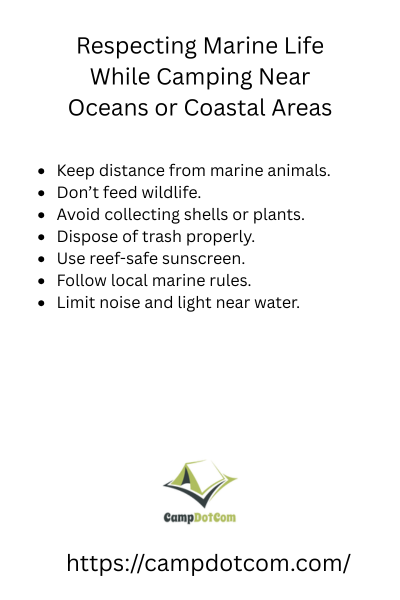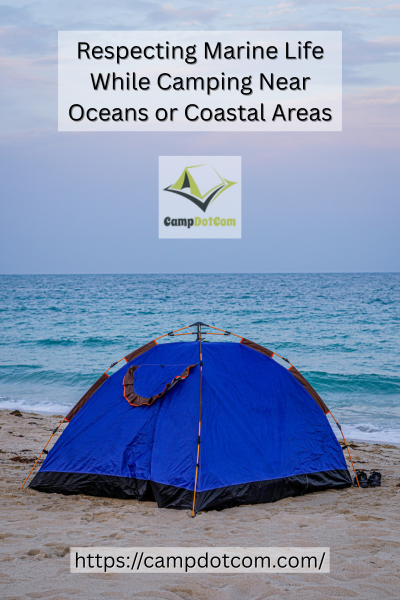Respecting marine life while camping near oceans or coastal areas is not just a nice idea, it is something that can make your trip much more rewarding. I learned that the hard way on a beach camping trip when I accidentally left my cooler lid open and woke up to a very smug looking seagull having breakfast at my expense. Lesson learned: the ocean is not just a backdrop, it is home to countless creatures who deserve our respect.
Read More About Respecting Marine Life While Camping Near Oceans or Coastal Areas

The Ocean is More Than Just a View
When you set up camp near the coast, you are stepping into a bustling neighborhood. Crabs, seabirds, fish, turtles, they are all living their lives while you roast marshmallows under the stars. Respecting their space is not about rules, it is about keeping their home safe so we can all enjoy it for years to come.
Think about it. That pretty tide pool you are tempted to poke around in? It is actually someone’s dining room, playground, and sometimes even nursery. By staying mindful, you are making sure the creatures in it can go on living undisturbed.
As an Amazon Associate, I earn from qualifying purchases. Some of the links in this article are affiliate links. This means that, at zero cost to you, I will earn an affiliate commission if you click through the link and finalize a purchase.
More Things to Know About Respecting Marine Life While Camping Near Oceans or Coastal Areas

Keep Your Camp Clean (Really Clean)
It’s amazing how quickly trash can sneak into the ocean. One windy night, and suddenly your snack wrapper is halfway to becoming fish food. Not good.
I’ve gotten into the habit of doing a quick “trash sweep” before bed. I check under chairs, around the tent, even in pockets. If it’s small enough for the wind to grab it, it’s small enough to end up in a turtle’s stomach.
And it’s not just about trash. Leftover food can attract animals, which might sound fun until you realize it can harm them. They might start depending on human snacks, or worse—get sick from eating things they’re not meant to.
Give Wildlife Room to Breathe
I get it, spotting a seal lounging on the rocks is exciting. But getting too close is stressful for them, even if they do not show it. Wildlife needs space to rest, feed, and just be. If you are close enough for them to change their behavior, you are too close.
The same goes for nesting birds. Some will abandon their eggs if they feel threatened, and no Instagram shot is worth that. Bring binoculars or a zoom lens if you want a great view without intruding.
Be Smart About Fires and Lights
A glowing campfire might be cozy for you, but too much light can confuse nocturnal creatures or even disorient sea turtles trying to find the ocean.
On one trip, we kept our lights low and watched as baby turtles emerged from their nest and made their way to the water. It was magical. If we’d had bright floodlights blaring, they might have headed the wrong way—straight into danger.
So, keep campfires contained and switch to red or dim lights after dark. You’ll still see just fine, and you’ll be helping wildlife stay on track.
Choose the Right Campsite
When you are camping near the ocean, it is tempting to set up right on the sand. But some areas are protected for a reason. They may be nesting grounds, feeding zones, or sensitive habitats.
Check for signs or ask local rangers where it is safe to camp. Not only will you avoid disturbing wildlife, but you will also stay clear of any surprise high tides. Trust me, waking up to waves lapping at your sleeping bag is not the refreshing beach wake up you might be imagining.
Simple Ways to Protect Wildlife on Your Beach Camping Trip
At the end of the day, respecting marine life while camping near oceans or coastal areas is not about following a bunch of boring rules. It is about sharing space. The ocean’s edge is one of the most incredible places to camp, but it is also one of the most delicate.
Every choice you make, from where you pitch your tent to how you store your food or even how bright your lantern is, has an impact. By being thoughtful, you are not just protecting the animals. You are also preserving the magic of coastal camping for the next person who wanders down that sandy path.
And honestly, when you camp this way, you will notice more. You will see tiny crabs scuttling at your feet, hear seabirds calling in the distance, and maybe, if you are lucky, watch a pod of dolphins cruise by at sunrise. That is the kind of trip you remember forever.
